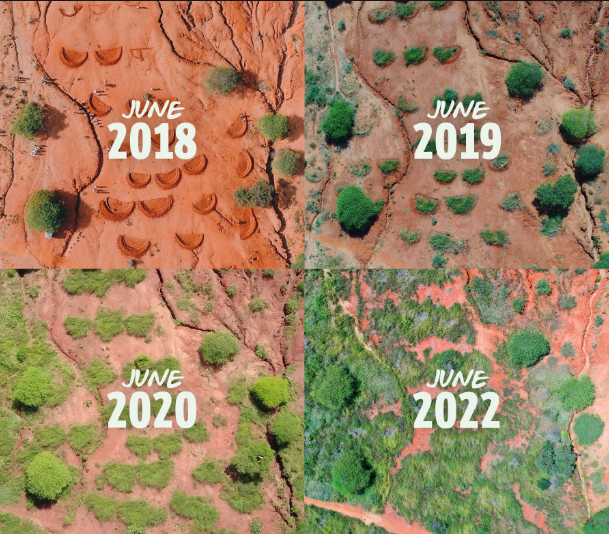Did you know that simply digging a slight ditch can completely change the health of a landscape?
In modern landscaping, any sort of hole or ditch is considered a “dangerous tripping hazard,” “unsightly,” or “a waste of space,” so everything is smoothed out. If you go to most cities and farms, the only non-flat places are designed to carry water away from cities, rather than hold onto it.
This thought process can not only increase overland flooding and wash away topsoil, but it also gives water no place to sit and be absorbed into the soil. Without any water capture gradually trickling into the soil and creating an underground reservoir, the landscape becomes less drought resistant and more susceptible to wildfires.
The permaculture techniques to correct this have many names and methods, including:
- Demi-lunes / Half - moons / Semi-circular bunds
- Eyebrow terraces / banquettes
- Negarim
- Contour bunds
- Micro basins
- Planting pits / Zai pits / Chololo pits
- Swales
They might be different shapes and use slightly different methods, but they all do all work the same on a basic level. The idea is to dig or build a shape that will slowdown and/or catch some of the movement of water. This can make the soil more absorbent (dry and hardened soil does not absorb water as easily) which promotes healthy microbiome of the soil.
Even if the water dries out visibly during the dry season, underground, they could be making a huge difference.

It is not new science, but instead something many cultures around the world have a long history with, but many modern farming practices(mostly to make it farming machine friendly) and development flatten everything out. If people changed this point of view, it could change our landscapes.
In cities, they look like a slight ditch in front of a house, or a creek in a greenspace.


(Image Sources: Image 1 | Image 2)
For other landscapes, it could be just slight indents in un-farmable areas, or ditches dug around farm perimeters.
They do not have to be very deep, and often do not need any fancy equipment to dig(most just take a shovel), but they can do amazing things.
In the process of reversing landscape desertification, it is proving drastically helpful. As the underground water reserves build, so does the vegetation.

(Image Source: Just Dig It. An example of demi-lunes / half-moons)
More Info:
